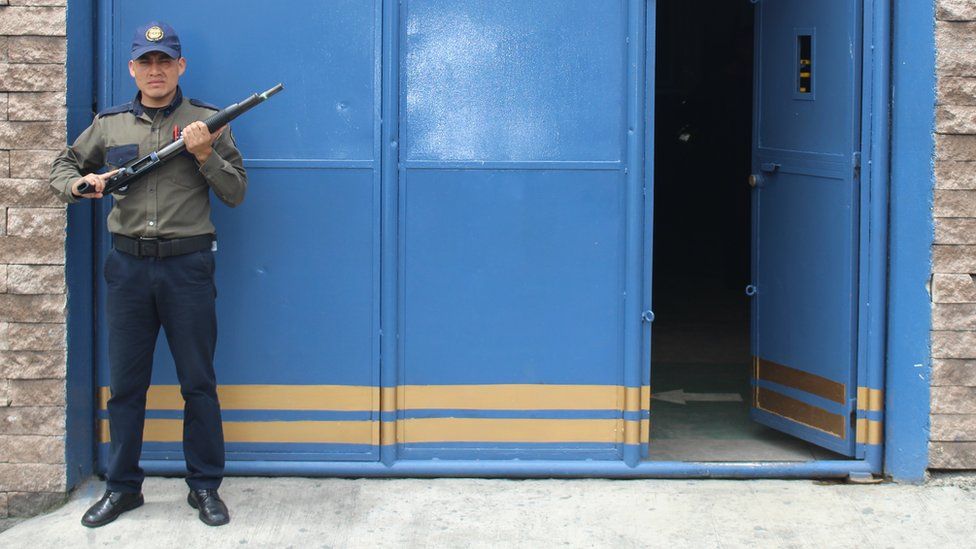Guatemala security: 'Those who can afford it buy protection'
- Published

A guard carrying a shotgun paces back and forth outside a commercial building in central Guatemala City.
On the bustling Avenue Reforma in the capital of Guatemala, in Central America, he has to keep his wits about him.
He has to be prepared at all times for the very real threat of armed robbery, a kidnapping attempt, or even murder.
With an average of 13 murders per day across the country last year, Guatemala is one of the most dangerous nations in the world, outside of a warzone.
Bedevilled by drug gangs, grinding poverty and an abundance of guns, violent crime rates are sky high.
In the capital, no suburb "including the upscale shopping, tourist and residential areas" are "immune to daytime assaults", warns the US State Department.
It adds that the situation is a "serious concern", not helped by "weak law enforcement and judicial systems", or the country's "legacy of societal violence" - a reference to the Guatemalan Civil War that ran from 1960 to 1996.
Under such circumstances it is perhaps no surprise that the country's private security sector is booming.
"The demand is always increasing," says Alredo Rosenberg, a manager at one such security firm, Sedicop. "Unfortunately this comes from the problem of insecurity that we all experience as Guatemalans."
Sedicop is one of almost 100 legally registered private security firms protecting citizens and businesses in Guatemala. A similar number of other security businesses work without government approval.
In total, there are estimated to be as many as 150,000 private security guards in the country, compared with a police force of just 30,000. This is in a country with a population of 15.5 million, of which 4.5 million live in and around the capital.
Sedicop and its 500 employees offer a range of services. If a business would like to see a shipment safely delivered, Sedicop can send a patrol car to drive with the van or lorry, for a price of $2 (£1.50) per km.
Want a security guard to watch a business premises? Prices start from $545 a month. Need a bodyguard? That's from $775 a month.
"People will pay for security," says Sedicop operations director Hans Castillo. "That's because it's a person's life we are talking about."
For fans of US heavy metal band Metallica, the group's 2010 concert in Guatemala City was an incredible night full of crunching guitar riffs and pounding drum solos.
But for Julio Colon, the outdoor gig of 27,000 people simply screamed "security hazard".
Mr Colon, a manager at private security firm Seguridad Integral, was given overall responsibility for the safety of the event.
He equipped the football stadium where the concert took place with metal detectors, formulated an exit plan, and ensured that security personnel with walkie-talkies were stationed everywhere. Thankfully the event passed without incident.
With people in Guatemala wanting life to go on as normal despite the daily security concerns, concerts and football matches continue to be held in the country. And Seguridad Integral has now provided security at thousands of such events since it was founded in 1990.
"At the time there weren't any companies that specialised in covering large events," says Mr Colon.
"Overseeing an event where there is movement of a lot of people in a few hours is very different to just looking after a building."
While most security firms in Guatemala provide general security services for companies, Seguridad Integral continues to specialise in large events, carving out its own niche. It charges as much as $26,000 per event.
Mr Colon says that demand has steadily grown, and that the firm now has 150 employees.
Such is the continuing demand in Guatemala for private security firms, that it has attracted entrants from overseas.
Ohad Steinhart moved to the country in 1994 to work as a firearms instructor after completing his service in the Israel Defence Forces.
About two years later he opened his own private security firm, Decision Ejecutiva, which offers personalised security packages, mainly to Guatemalan, Mexican and American businesspeople.
At the time his clients' biggest concern was kidnapping.
However, Mr Steinhart says he needs to continue to adapt to an ever-changing security situation in Guatemala. He adds that in recent years there has been a big rise in the number of extortion cases.
"In this country when you close one hole, another two open," he says in regard to Guatemalan security issues.
Decision Ejecutiva charges from $1,500 per month for a personal bodyguard, and now employs 300 people.
While Guatemala now has more than 200 private security firms, Mr Steinhart says there is ample work for all of them. And this situation is not likely to change any time soon.
Adriana Beltran, a security expert at US think tank Washington Office On Latin America, says that private security firms are so in demand in Guatemala because people don't believe that the police or other state institutions can protect them.
"Those who can afford it turn to private security firms for protection," she says.
Back on Avenue Reforma the security guard is still walking back and forth, and doesn't stop to talk.
He was hired by a building that has cafes and restaurants at street level, with offices above containing a law firm, travel agent and TV station.
Hector Bernhard, the building's administrator, says: "We had lots of robberies, so we had to put guards outside... when there are guards people think more carefully [about committing a crime]."
Follow Business Brain editor Will Smale on Twitter @WillSmale1